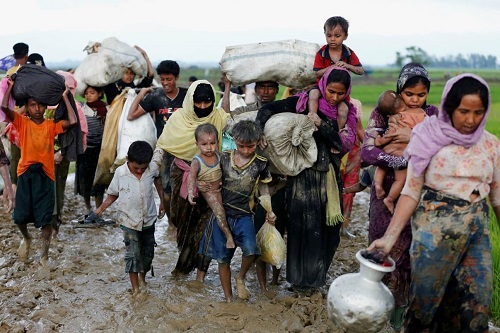Reuters photo
By
Ratnesh Dwivedi
The Rohingya trace their origin to 3000 BC and were given the name by the British. They are a population of 3 million Arkanese descendants living in the western coastal area of Rakhine province in Myanmar. They are not called Rohingya by the Myanmarese government instead referred to as Bengali Muslims, which is partly true as a minor part of them are Bengali Hindus. They are stateless, homeless subjects of Myanmar and do not have any rights to speech, rights to education, rights to medical treatment and rights to vote in Myanmar as the government refuses to call them part of Myanmar. However Rakhine State, where 98% Rohingya live. is very much part of Myanmar.
Rohingyas are denied citizenship of Myanmar as per 1982 Myanmar Nationality Law. Making the situation worse is that the Rohingya faced military crackdowns in 1978, 1982, 1991-92, 2012, 2015 and now in 2016-17.
The United Nations call it ‘ethnic cleansing’ while on the other hand the Rohingyas claim they are very much an indigenous community of Western Myanmar with a heritage dating back one millennium. They call them descendants of Arakan which was an independent Kingdom between India and South East Asia in ancient past.
After the current crisis and military crackdown by the Myanmarese government in Rakhine province where 98% Rohingya live, over 90,000 Rohingya fled to Bangladesh, some to neighboring India. More than 100,000 are confined to army concentration camps in Myanmar while the majority of them are still in ‘No Man’s Land’ on borders of Myanmar, Bangladesh and India waiting to take refuge in these countries.
Following a Rohingya rebel attack that killed 12 military personnel of the Myanmarese Army, the arrmy launched cleansing operations which left 3,000-5,000 Rohingya dead, many tortured, women raped and villages burnt. Now almost 400,000 Rohingya are trying to flee either to Bangladesh or India, rejected by the country they call home.
In India the government feels that the Rohingya will get involved in terrorist activities along with Pakistani infiltrators and ISIS in India and Bangladesh if they are allowed shelter and entry in both countries. On the other hand both Bangladesh and India have their own home grown problems like food and safety to a combined population of 2 billion.
India had already given shelter to 500,000 Bangladeshis, many of them illegal residents in encroached areas in Delhi and West Bengal.The Indian right wing population always questions decision of the government as to why it is necessary to further escalate problems by allowing millions of Rohingyas to take refuge in the country.
Ratnesh Dwivedi
Ratnesh Dwivedi is a seasoned Academician, Author, Journalist, NASA Certified Educator and Board Member with 15 plus years in teaching and corporate. He has seen changing face of global politics and has written extensively on International Affairs.
He serves on board of a dozen global firms ranging from Mining, Oil & Gas, Electricity, Energy,Cyber Security, Intelligence, Defence and Counter Terrorism having finest people from corporate and Gov on board.
He holds membership with global organizations such as ECREA-Brussels, Mission Essential-Virginia, Global Ethics Network-Wash, American Astronomical Society-Wash, Internet Society-Virginia, CSIS-PONI-Wash, RTDNA-Wash, NSTA-Virginia, EIN News Desk, Bush Center, Texas and Foreign Correspondent Club, Delhi.
He has authored six books. The Story of an Intern is a Reportage, The Cosmic Mask is a Space Fiction. Third and fourth are awarded academic books. His fifth book, US Intelligence and Cost of War talks about USA Military engagements in Middle East .His sixth book on manned and unmanned missions of NASA is in print.
Ratnesh Dwivedi bears the honour of attending several high rated workshops of NASA and is awarded multiple certifications from NASA.
He has set up Radio and TV Stations in India. He is widely published Author in the field of Media and Communication with 34 publications and presentations across globe with 15000 downloads, which itself is a record.
He is Director-India and Professor with Global Institute for IT & Management, New York. He serves as Country Head with Advisors Energy Group NJ and Director with Synergence and Pro Energy Trade based in Chicago, all Energy and Financing companies. He is Manager-SMXP, Australia, a mining firm. He works as Country Head with Orion Global Technologies, UK. He is India Correspondent of Tuck Magazine. He is Institutional Representative with SECINDEF-Israel, an Intelligence agency and Global Representative with Opia and D-Fence, Israel.



No Comments Yet!
You can be first to comment this post!